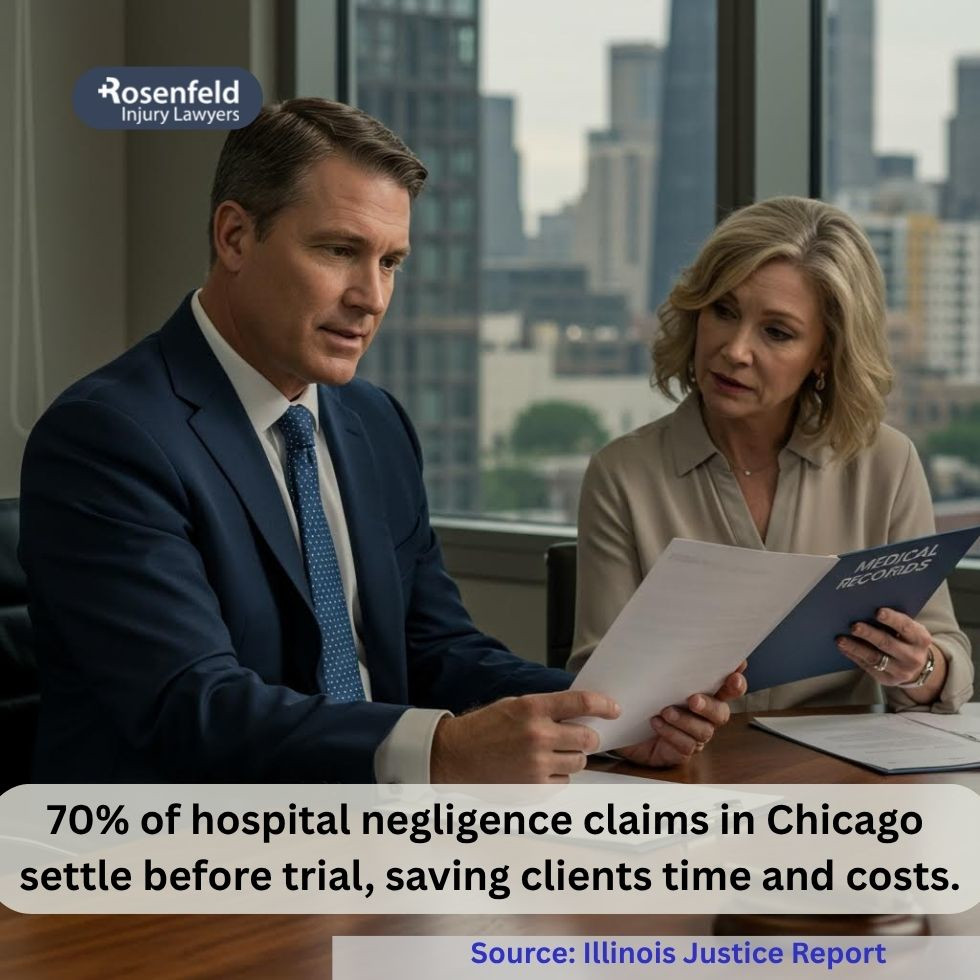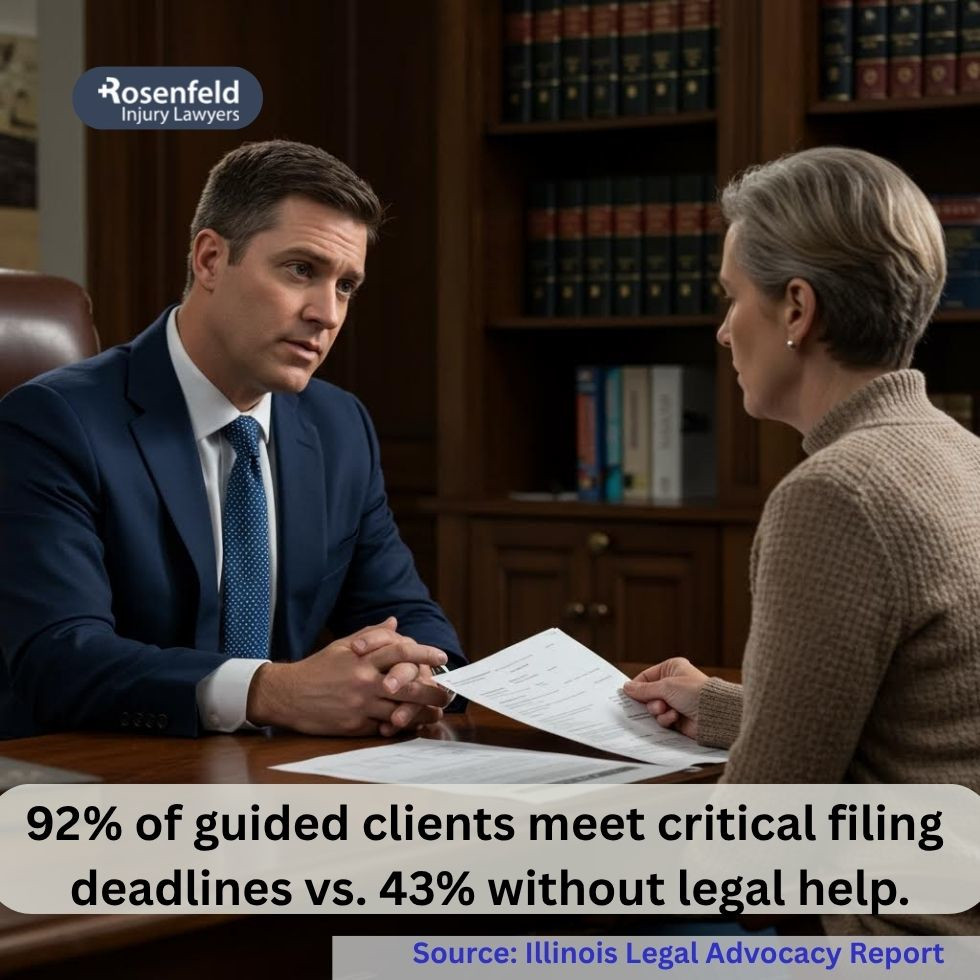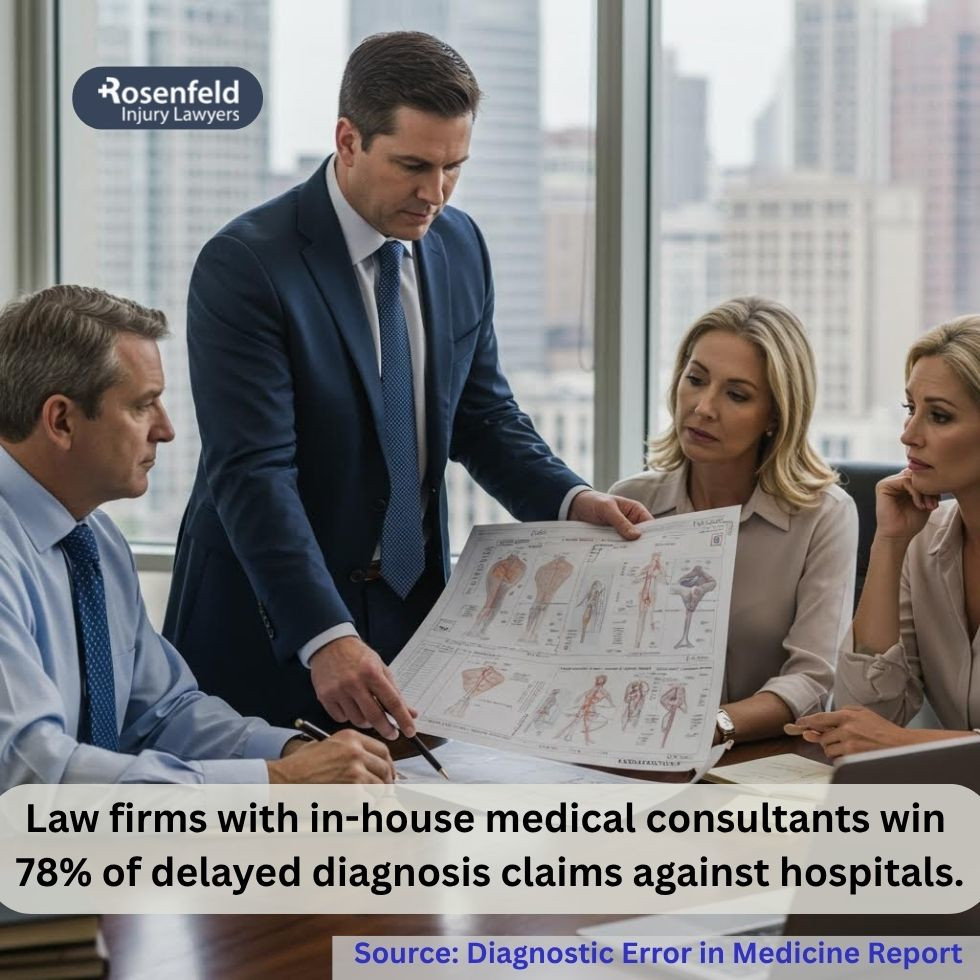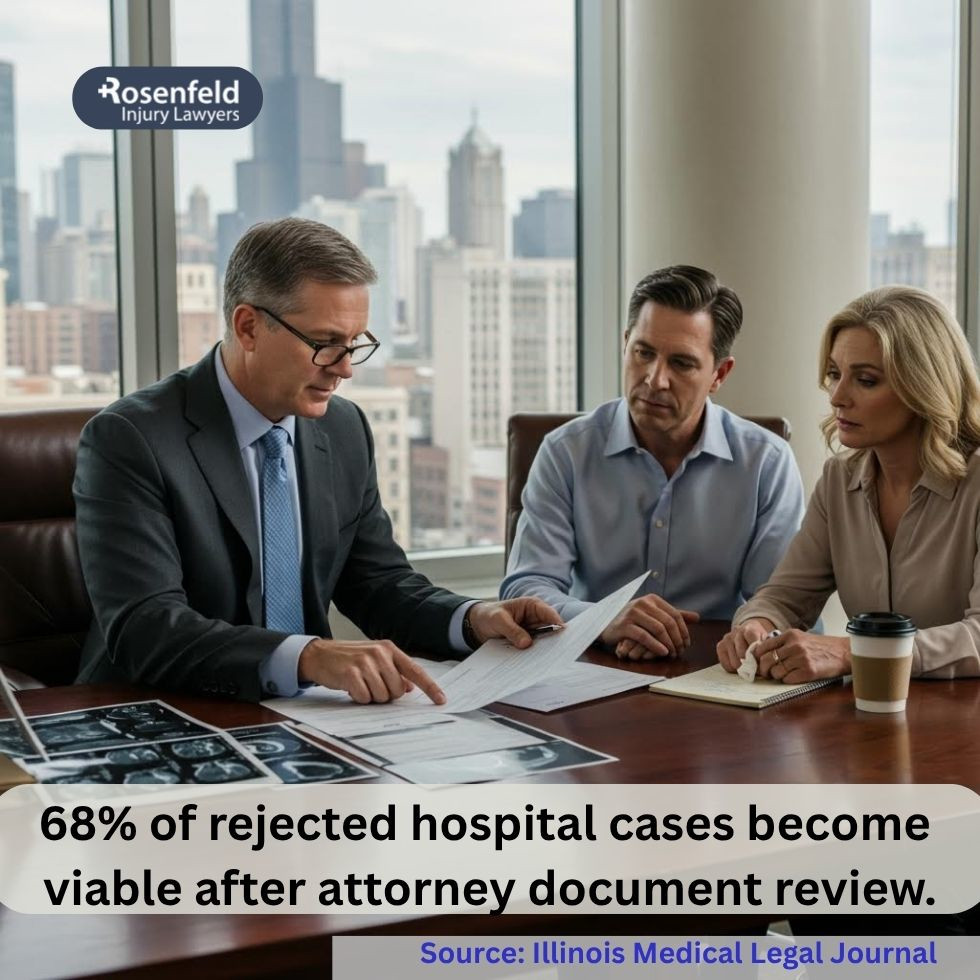- 24/7 Free Consultation: (888) 424-5757 Tap Here To Call Us
How to File a Lawsuit Against a Hospital in Illinois
Knowing how to file a lawsuit against a hospital in Illinois involves specific legal steps, especially when the claim is based on medical malpractice or hospital negligence. If a hospital’s staff, physicians, or policies caused serious harm, victims have the right to pursue compensation.
These cases can include surgical errors, birth injuries, diagnostic errors, or incorrect treatment. Understanding your rights and the legal process is the first step toward holding a medical facility accountable for the harm you’ve suffered.
Hospital Liability in Illinois
Hospitals in Illinois may be held legally responsible for patient harm when their actions—or the actions of their staff—fall below accepted standards of care. Liability may arise from the hospital’s own misconduct or through its responsibility for the people it employs.
Understanding the different types of hospital liability can help determine whether you have a valid legal claim and how best to pursue compensation for injuries caused by medical errors or systemic failures within the medical facility.
Direct Liability: Negligence of the Hospital Itself
Hospitals can be directly liable when their own actions—or lack of action—cause patient harm. Common examples include hiring unqualified staff, failing to train employees properly, or not addressing repeated safety violations.
Overworked or understaffed units can also lead to dangerous delays in care. If a hospital fails to maintain equipment or provide a clean and safe environment, it may be found directly negligent. Poor internal policies that compromise patient safety also expose the hospital to direct liability.
Vicarious Liability: Responsibility for Employee Actions
Under Illinois law, hospitals can be held vicariously liable for the negligent acts of their employees. This includes nurses, medical technicians, physician assistants, doctors, and other medical professionals directly employed by the hospital.
If an employee makes a mistake while performing job duties, such as administering the wrong medication or failing to monitor a patient properly, the hospital may be responsible. This legal principle, known as “respondeat superior,” allows patients to pursue a claim against the hospital rather than only the individual provider.
When the Doctor is an Independent Contractor
Hospitals often argue that they aren’t liable for the actions of doctors who are independent contractors. However, Illinois law allows an exception under the doctrine of “apparent agency.”
If a patient reasonably believes the doctor works for the hospital, because the hospital assigned the doctor, or the doctor wore a hospital ID, the hospital may still be held liable. Courts examine how the hospital presented the relationship and whether the patient relied on that appearance.
Corporate Negligence
Corporate negligence refers to a hospital’s direct duty to ensure patient safety. This includes verifying that medical staff have valid licenses, monitoring care quality, and implementing effective patient safety protocols.
If a medical facility fails to enforce critical policies, respond to repeated safety complaints, or investigate serious incidents, it may be held liable for systemic negligence. Unlike vicarious liability, corporate negligence focuses on the hospital’s own failures in upholding its organizational responsibilities to patients.

Common Grounds for Lawsuits Against Hospitals
Hospitals are expected to provide a safe environment and competent care. When they fail in these duties, serious harm can occur. Patients may have grounds to sue a hospital when preventable medical errors or systemic failures lead to injury or wrongful death. Below are common reasons patients and families pursue legal action against hospitals in Illinois.
Emergency Room Errors
The emergency room is a high-pressure environment where medical mistakes can have immediate consequences. Common ER errors include misdiagnosing serious conditions like stroke or heart attack, delaying critical treatment, and failing to admit patients who require further medical care.
Overcrowding, understaffing, or poor communication can all contribute to these mistakes. If an ER patient’s condition worsens or they die due to negligence, the hospital may be held accountable through a medical malpractice lawsuit.
Surgical Errors
Surgical errors are among the most serious and preventable medical mistakes in hospital care. Examples include performing surgery on the wrong body part, leaving instruments inside the patient, or errors in anesthesia dosage.
These incidents can result in permanent injury, infection, or death. Hospitals may be liable if poor protocols, miscommunication, or lack of oversight contributed to the mistake. Medical malpractice victims may pursue a claim to recover compensation for additional surgeries, lost income, and long-term care needs.
Nursing Negligence
Nurses are responsible for medication administration, monitoring vital signs, and assisting in medical treatment. Errors in any of these duties can have severe consequences. Common nursing mistakes include giving the wrong dosage of medication, failing to recognize and report changes in a patient’s condition, or neglecting wound care.
Hospitals may be held liable if inadequate staffing, training, or supervision contributed to the nurse’s error. A hospital negligence lawsuit may help address the harm caused by these avoidable mistakes.
Hospital-Acquired Infections (HAIs)
Patients expect hospitals to be safe, sterile environments. When hospitals fail to follow proper infection control protocols, patients can contract serious infections such as MRSA, sepsis, or pneumonia.
These infections may stem from unclean equipment, unsanitized rooms, or poor hand hygiene by staff. If an HAI is traced back to negligence, the hospital can be held legally responsible. Lawsuits for HAIs often seek compensation for prolonged hospital stays, additional medical treatment, and long-term health complications.
Birth Injuries
Labor and delivery require careful monitoring and quick decision-making. Negligence during childbirth can result in severe injuries to both the mother and baby, such as oxygen deprivation, nerve damage, or brain injury.
Common causes include failure to monitor fetal distress, misuse of delivery tools, or delayed decisions to perform a C-section. Hospitals may be held accountable if poor protocols, staff miscommunication, or insufficient care led to preventable birth injuries. Birth injury cases often involve significant long-term medical and financial consequences.
Misdiagnosis or Delayed Diagnosis
Failing to diagnose a serious condition in time can lead to worsened outcomes or wrongful death. Hospitals may be liable if misdiagnosis or delayed diagnosis occurred due to lab errors, lost test results, or inadequate review by staff.
Commonly missed conditions include infections, cancer, and heart disease. When hospital systems or personnel cause preventable delays in diagnosis or treatment, a medical malpractice claim may be filed for the resulting harm.

Steps to Take Before Filing Medical Malpractice Lawsuits Against a Hospital
Before filing a lawsuit against a hospital for medical malpractice, there are key steps you should take to strengthen your claim. Taking early action and preserving important documentation can significantly impact your right to compensation for your injuries.
Gathering Your Medical Records
Patients have the legal right to request copies of their medical documents from the hospital. These records include doctors’ notes, test results, prescriptions, surgical reports, and discharge summaries. You can submit a written request to the hospital’s medical records department, usually with a signed authorization form and a small fee.
These documents are essential for reviewing the care you received and identifying potential instances of medical negligence. Complete and timely access to your records can provide critical support for your case.
Documenting All Aspects of Your Care and Treatment
Detailed documentation helps establish a timeline of events and supports your claim. Keep copies of all medical bills, receipts, prescriptions, and records of hospital visits. Also track symptoms, treatment outcomes, and communication with doctors or staff.
Personal notes or a journal describing your experience and how the injury has affected your daily life can be valuable. The more complete your records, the easier it becomes to identify lapses in care and calculate damages related to pain, suffering, and lost wages.
Identifying All Potentially Liable Parties
A hospital negligence lawsuit may involve more than one responsible party. While the hospital itself may be liable for systemic failures, you should also consider the actions of individual staff members, such as doctors, nurses, and technicians, who played a role in your care.
In some cases, third-party contractors or outside specialists may also be responsible. Properly identifying every negligent healthcare provider allows your attorney to build a comprehensive claim and pursue all possible avenues for compensation.
Consulting with a Medical Malpractice Attorney
Medical malpractice lawsuits against hospitals are complex and require an in-depth understanding of both personal injury law and medicine. An experienced medical malpractice attorney can review your case, identify legal options, and help you avoid procedural mistakes.
They can also handle communication with the hospital and its insurance providers. Legal representation improves your chances of a successful outcome and may lead to a fair medical malpractice settlement without a lengthy trial. Many personal injury attorneys offer a free consultation to evaluate your claim.

The Affidavit of Merit Requirement in Illinois Hospital Negligence Cases
Illinois law requires most medical negligence lawsuits, including those against hospitals, to be supported by an affidavit of merit. This document must be filed by the plaintiff or their attorney and affirms that a qualified medical professional has reviewed the facts of the case and believes there is a reasonable and meritorious basis for filing the lawsuit. Without this affidavit, the court may dismiss the case, regardless of the strength of the underlying claims.
Contents of the Affidavit of Merit
The affidavit must include a written report from a licensed medical professional who practices or teaches in the same area of medicine as the defendant. The report should state that the expert has reviewed the relevant medical records and believes the hospital or its staff failed to meet the accepted standard of care. It must also explain how this failure likely caused harm. This documentation is critical in establishing the legal foundation of the case.
Deadline for Filing the Affidavit of Merit
The affidavit of merit must be filed within 90 days of filing the initial complaint in an Illinois medical malpractice case. If the report from the medical professional is not available at the time of filing, the plaintiff can submit the affidavit with a certificate stating that the written report will follow. Courts may grant extensions in limited circumstances, but missing this deadline without a valid reason can result in the dismissal of your lawsuit.

Filing Your Lawsuit Against the Hospital
To start a medical malpractice lawsuit against a hospital in Illinois, you must first draft a complaint outlining the facts, legal claims, and the harm suffered. Choose the correct circuit court based on where the negligence occurred or where the hospital is located.
File the complaint along with the required affidavit of merit at the court clerk’s office. After filing, you must formally serve the hospital with the lawsuit following Illinois service of process rules, ensuring legal notice is properly given.
The Hospital Negligence Litigation Process
After filing a lawsuit against a hospital, the legal process begins with several important stages. This includes the hospital’s formal response, exchanging evidence, expert evaluations, and potentially going to trial. Many cases are resolved through settlement before reaching that point, but your medical malpractice lawyer will be prepared for every step if the case proceeds.
The Hospital’s Response: Answer or Motion to Dismiss
Once served with the lawsuit, the hospital may respond by filing an “answer,” which admits or denies the allegations, or it may submit a motion to dismiss. A motion to dismiss argues that the case should not move forward due to legal deficiencies, such as a lack of jurisdiction or failure to state a valid claim. If denied, the case proceeds to the next stage.
Discovery: Gathering Evidence from Both Sides
Discovery is the formal exchange of information between both parties. During this phase, attorneys use tools like interrogatories (written questions), depositions (sworn testimony), requests for production (seeking documents), and requests for admission. This stage helps each side build their case and uncover important facts related to the alleged negligence, injuries, and damages.
Expert Witness Testimony: Proving Medical Negligence
In medical malpractice cases, expert witnesses are essential. A qualified medical expert evaluates the care provided and determines whether it met accepted medical standards. The expert’s opinion helps show how the hospital or its staff deviated from that standard and how that negligence directly caused the patient’s injuries or harm.
Motions and Hearings
Throughout litigation, either party may file motions to address legal or procedural issues, such as excluding evidence or resolving parts of the case early. These motions are typically resolved during hearings before a judge. While not as formal as a trial, these hearings can significantly influence the case’s direction.
Settlement Negotiations
Many medical malpractice claims are resolved through settlement before reaching trial. During negotiations, both parties discuss terms that may include compensation for medical bills, lost income, and other damages. Settlements can help avoid the uncertainty and stress of a trial, but your hospital negligence lawyer will only recommend accepting if it reflects fair compensation.
Trial: Presenting Your Case to a Jury
If no settlement is reached, the case proceeds to trial. This begins with jury selection, followed by opening statements from both sides. Each party then presents evidence, including witness testimony and expert opinions. After closing arguments, the jury deliberates and issues a verdict. A successful outcome can result in a court-ordered judgment against the hospital.
Statute of Limitations for Suing a Hospital in Illinois
The Illinois statute of limitations for filing a medical malpractice claim against a hospital is generally two years from the date the patient knew, or reasonably should have known, that an injury occurred due to medical negligence.
However, there is an absolute time limit of four years from the date the negligent act took place, regardless of when the injury was discovered. Missing these deadlines can prevent an injured patient from pursuing legal action or recovering compensation (735 ILCS 5/13-212).

Why You Need an Experienced Attorney to Sue a Hospital
Suing a hospital for medical negligence involves complex legal procedures, strict deadlines, and the need to present expert medical evidence. An experienced medical malpractice attorney in Chicago from Rosenfeld Injury Lawyers can help you build a strong case by gathering medical records, working with qualified medical experts, and identifying all liable parties.
Our team understands how to handle negotiations with insurance companies and hospital legal teams, and we’re fully prepared to take your case to trial if necessary. With our experience and resources, we can pursue the maximum compensation you deserve.
Consult a Chicago Medical Malpractice Attorney

If you or a loved one suffered harm due to hospital negligence, the legal team at Rosenfeld Injury Lawyers is here to help. Our team has extensive experience handling medical malpractice cases throughout Illinois and is committed to helping injured clients seek compensation for their losses.
Call us at (888) 424–5757 or fill out our contact form to speak with a Chicago personal injury attorney. We’re ready to answer your questions and discuss your legal options.
All content undergoes thorough legal review by experienced attorneys, including Jonathan Rosenfeld. With 25 years of experience in personal injury law and over 100 years of combined legal expertise within our team, we ensure that every article is legally accurate, compliant, and reflects current legal standards.







